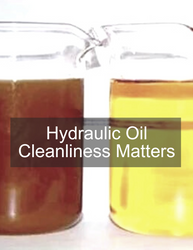In the intricate world of hydraulic systems, the importance of clean fluid cannot be overstated. The consequences of neglecting fluid cleanliness can extend far beyond mere inconvenience, leading to machine failures, increased operational costs, and a significant dent in overall business efficiency. Let's explore the domino effect that dirty hydraulic fluid can set off, along with the myriad benefits that come with maintaining a pristine hydraulic system.
The Downside of Dirty Fluids:
- Overheating: One of the first casualties of dirty hydraulic fluid is the risk of system overheating. Old and contaminated fluid can compromise viscosity, jeopardizing the system's ability to maintain consistent pressure. The consequences? Not only does it lead to potential machine failure, but it also initiates a destructive cycle where overheating causes the oil to burn, introducing contaminants that can abrasively impact the machinery.
- Fluid Contamination: Dirty fluid isn't just about the presence of particles; it's a concoction of particles, condensation, air, and dust. Each element poses a unique threat to the hydraulic system. Particles and dust can directly lead to machinery failure, while condensation may result in rust and corrosion. Air contamination, on the other hand, alters fluid elasticity, hindering the system's ability to operate smoothly and potentially causing cavitation.
- Oxidation: As fluid ages, it undergoes oxidative degradation. This process, often detectable through advanced oil tests, manifests as a foul smell and a darkened appearance of the hydraulic fluid. Oxidation can compromise the overall health of the system, and if left unchecked, it might necessitate a complete oil change to maintain optimal performance.
- Additive Depletion: Hydraulic fluids are often enhanced with additives that deteriorate over time due to burnup and other factors. If these additives deplete significantly, the entire oil in the machine might require replacement, adding to the operational costs.
The Upside of Clean Hydraulic Fluids:
- Decreased Downtime: Contaminated fluids are a primary culprit behind machine downtime. Regular maintenance and adherence to cleanliness standards significantly reduce the risk, ensuring a smoother and more productive operation that doesn't strain the company financially.
- Reduced Waste: Clean fluids translate to fewer filter changes, minimizing fluid loss and additional costs associated with replacements. This not only conserves resources but also contributes to a more sustainable and cost-effective operation.
- Reduced Energy Costs: Dirty fluids with higher viscosities make pumps work harder, leading to increased pressure and faster filter loading. Clean fluid, in contrast, facilitates smoother operation, reducing the strain on the machine and lowering energy costs in the long run.
- Extended Fluid Life: Maintaining cleanliness standards not only saves on immediate costs but also extends the life of hydraulic fluid. This translates to less frequent fluid changes and proper disposal, resulting in substantial long-term savings.
The cleanliness of hydraulic fluids is not just a matter of routine maintenance; it's a strategic investment in the efficiency, longevity, and cost-effectiveness of your hydraulic systems. Regular checks, adherence to cleanliness standards, and a proactive approach to fluid management are key to unlocking the full potential of your machinery.
A hydraulic service team you can trust... only at Flow Dynamics! Call us to schedule your inspection today! At Flow Dynamics, we do it all including testing, filtration, cleanliness, and flushing hydraulic systems at 205-581-1200

